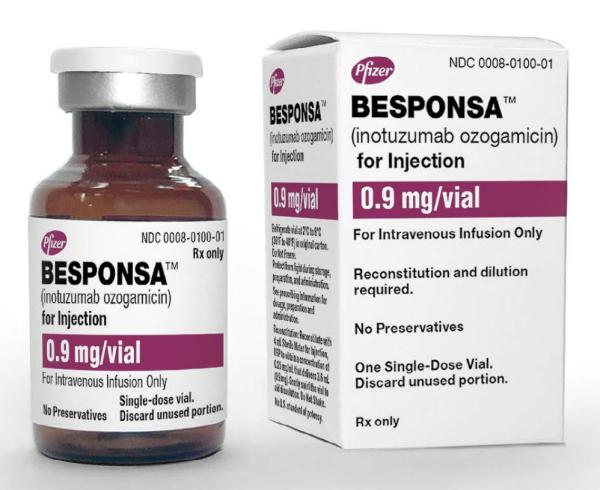Besponsa Side Effects
Generic name: inotuzumab ozogamicin
Note: This document contains side effect information about inotuzumab ozogamicin. Some dosage forms listed on this page may not apply to the brand name Besponsa.
Applies to inotuzumab ozogamicin: intravenous powder for solution.
Warning
Intravenous route (Powder for Solution)
Hepatotoxicity, including fatal and life-threatening VOD occurred in patients who received inotuzumab ozogamicin.A higher post-HSCT non-relapse mortality rate occurred in patients receiving inotuzumab ozogamicin.
Serious side effects of Besponsa
Along with its needed effects, inotuzumab ozogamicin (the active ingredient contained in Besponsa) may cause some unwanted effects. Although not all of these side effects may occur, if they do occur they may need medical attention.
Check with your doctor or nurse immediately if any of the following side effects occur while taking inotuzumab ozogamicin:
More common
- Black, tarry stools
- bleeding gums
- blood in the urine or stools
- chest pain
- chills
- cough or hoarseness
- coughing up blood
- difficulty in breathing or swallowing
- dizziness
- fever
- headache
- increased menstrual flow or vaginal bleeding
- lower back or side pain
- nosebleeds
- painful or difficult urination
- pale skin
- paralysis
- pinpoint red spots on the skin
- prolonged bleeding from cuts
- red or dark brown urine
- sore throat
- sores, ulcers, or white spots on the lips or in the mouth
- swollen glands
- troubled breathing with exertion
- unusual bleeding or bruising
- unusual tiredness or weakness
- yellow eyes or skin
Other side effects of Besponsa
Some side effects of inotuzumab ozogamicin may occur that usually do not need medical attention. These side effects may go away during treatment as your body adjusts to the medicine. Also, your health care professional may be able to tell you about ways to prevent or reduce some of these side effects.
Check with your health care professional if any of the following side effects continue or are bothersome or if you have any questions about them:
More common
- Constipation
- decreased appetite
- diarrhea
- nausea
- stomach pain
- swelling or inflammation of the mouth
- vomiting
For Healthcare Professionals
Applies to inotuzumab ozogamicin: intravenous powder for injection.
Hematologic
Very common (10% or more): Thrombocytopenia (51%) (42% of which were Grade 3 or higher), neutropenia (49%) (48% of which were Grade 3 or higher), anemia (36%) (24% of which were Grade 3 or higher), leukopenia (35%) (33% of which were Grade 3 or higher), febrile neutropenia (26%) (all of which were Grade 3 or higher), lymphopenia (18%) (16% of which were Grade 3 of higher)
Common (1% to 10%): Pancytopenia (e.g., bone marrow failure, febrile bone marrow aplasia, pancytopenia)[Ref]
Hypersensitivity
Common (1% to 10%): Hypersensitivity[Ref]
Immunologic
Very common (10% or more): Infection (48%) (28% of which were Grade 3 or higher)
Frequency not reported: Immunogenicity[Ref]
Local
Common (1% to 10%): Infusion related reaction[Ref]
Musculoskeletal
Frequency not reported: Muscle hemorrhage[Ref]
Ocular
Frequency not reported: Conjunctival hemorrhage, eyelid bleeding[Ref]
Metabolic
Very common (10% or more): Decreased appetite (12%)
Common (1% to 10%): Lipase increased, amylase increased, hyperuricemia
Uncommon (0.1% to 1%): Tumor lysis syndrome[Ref]
Genitourinary
Very common (10% or more): Vaginal hemorrhage (10%)
Frequency not reported: Menorrhagia, hematuria[Ref]
Hepatic
Very common (10% or more): Hyperbilirubinemia (21%), transaminases increased (26%), gamma-glutamyltransferase increased (21%), alkaline phosphatase increased (13%)[Ref]
Respiratory
Frequency not reported: Epistaxis[Ref]
Other
Very common (10% or more): Fatigue (35%), pyrexia (32%), chills (11%)
Frequency not reported: Hemotympanum[Ref]
Nervous system
Very common (10% or more): Headache (28%)[Ref]
Cardiovascular
Very common (10% or more): Hemorrhage (33%) (5% of which were Grade 3 or higher)
Common (1% to 10%): QT prolonged
Frequency not reported: Intracranial hemorrhage, subdural hematoma[Ref]
Dermatologic
Frequency not reported: Ecchymosis, hemorrhage subcutaneous, mesenteric hemorrhage, petechiae, post-procedural hematoma[Ref]
Gastrointestinal
Very common (10% or more): Nausea (31%), abdominal pain (23%), diarrhea (17%), constipation (17%), vomiting (15%), stomatitis (13%)
Common (1% to 10%): Abdominal distention, ascites
Frequency not reported: GI hemorrhage, hemorrhagic gastritis, gingival bleeding, hematemesis, hematochezia, hemorrhoidal hemorrhage, intraabdominal hemorrhage, lip hemorrhage, upper/lower GI hemorrhage, mouth hemorrhage, oral mucosa hematoma, rectal hemorrhage[Ref]
Frequently asked questions
More about Besponsa (inotuzumab ozogamicin)
- Check interactions
- Compare alternatives
- Pricing & coupons
- Drug images
- Dosage information
- During pregnancy
- FDA approval history
- Drug class: miscellaneous antineoplastics
- Breastfeeding
- En español
Patient resources
Professional resources
Related treatment guides
References
1. Product Information. Besponsa (inotuzumab ozogamicin). Wyeth Laboratories. 2017.
Further information
Always consult your healthcare provider to ensure the information displayed on this page applies to your personal circumstances.
Some side effects may not be reported. You may report them to the FDA.

